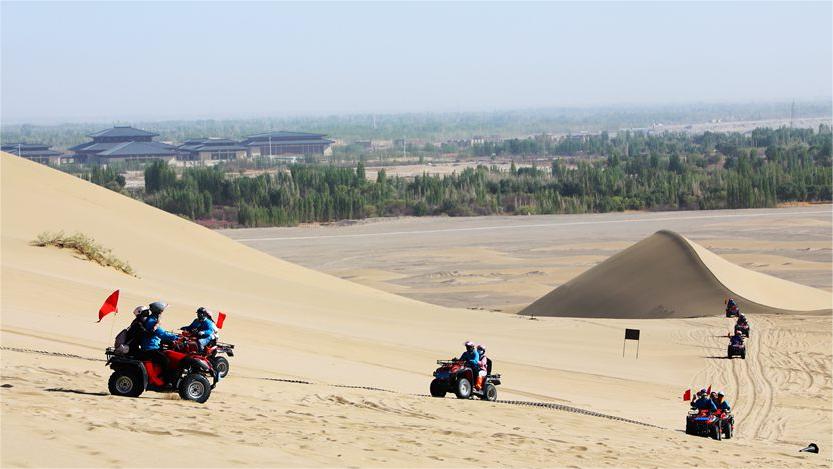China's Q1 new-energy power generation installation surges; 'overcapacity theory' fake: experts
China's installed capacity for power generation from clean-energy sources surged in the first quarter, which analysts attributed to growing domestic demand as China is pursuing high-quality and green development.
Analysts refuted "overcapacity" claims hyped recently by some Western countries, noting that such increases in new-energy installations demonstrated China's efforts to fulfill its commitment to reaching carbon neutrality by 2060. The Western hyping of China's "overcapacity" is a discourse trap that aims to curb green product exports.
They also noted that from a global perspective, more installed capacity in power generation from clean sources - wind, solar, hydro and other types of new energy - is required to fulfill the green transition worldwide.
According to statistics released by China's National Energy Administration (NEA) on Monday, solar power installations totaled about 660 million kilowatts in the first quarter, increasing by 55 percent year-on-year. Wind power installations grew by 21.5 percent on a yearly basis, amounting to about 460 million kilowatts.
Total installed power generation capacity stood at about 2.99 billion kilowatts as of end-March, up 14.5 percent year-on-year.
As China progresses in its green transformation, the share of renewable energy installations continues to rise, surpassing 50 percent of total power generation capacity as of December 2023, according to the NEA.
Analysts said that although power generated from new-energy sources increased significantly, there is still huge potential for green power generation deployment, primarily aimed at satisfying domestic demand for the green transition.
In the first quarter, China's total electricity use rose to 2.34 trillion kilowatt-hours, up 9.8 percent year-on-year, per NEA statistics.
The rise in installed electricity capacity reflects China's increasing energy demand tied to its economic recovery, Hu Qimu, deputy secretary-general of the digital-real economies integration Forum 50, told the Global Times on Monday. "As China's economy recovers, the demand for energy will continue to rise."
China's demand for photovoltaic (PV) products remains strong. There is still room for further growth after years of rapid development, especially in the market for building-integrated PV systems, Feng Chao, general manager of a Zhengzhou-based energy company, told the Global Times on Monday.
In response to Western hyping of "overcapacity," Hu noted that Western countries continue to develop their coal power capacities while setting up trade barriers against Chinese green products, such as PV panels, although they need Chinese products to empower their green transitions.
To combat climate change, resources across the world should be fully mobilized. Globally, green capacity is not excessive, but is actually in dire scarcity. The problem now is not "overcapacity" but "over-anxiety," said Xie Feng, Chinese Ambassador to the US, at the opening ceremony of the Harvard Kennedy School China Conference 2024 on Friday, according to the official website of the Chinese Embassy in the US.
The World Economic Forum (WEF) said in February that along with demand-side interventions such as energy efficiency, a rapid and responsible scaling-up of renewables is critical to the transition, aligning with the ambitious target set at COP28 to triple the world's installed renewable energy generation capacity to at least 11,000 gigawatts by 2030.
According to an International Energy Agency report in January, the amount of renewable energy capacity added around the world grew by 50 percent in 2023, reaching almost 510 gigawatts.
That's a gap of 10,490 gigawatts from the WEF's 2030 forecast.
"Calling for a stronger climate response on the one hand but erecting green trade barriers on the other would only raise the costs for one's own low-carbon transition, and also slow down the global development of clean energy," Xie stressed.
In a fireside chat with Founding Dean of Harvard Kennedy School Prof. Graham Allison on Friday, Xie also noted that the US is asking China to run barefooted while one wears high-tech track shoes in a race by slapping sanctions on Chinese companies according to its own domestic laws and forcing other countries to ban exports of certain devices and technologies to China.
"Even when barefooted, some top Chinese players, such as producers of electric vehicles, lithium-ion batteries and PV products, have managed to take the lead. The US then accuses them of causing 'overcapacity' and posing a threat to other contestants, demanding they quit the race. This is not fair," Xie noted.
Photos
Related Stories
- High-altitude Maerdang Hydropower Station in Northwest China starts operation
- China's energy-rich provinces embark on green, modern development path
- 24 Solar Terms: 5 things you may not know about Grain Rain
- Analysis: Does China really have excess clean energy products?
- People watch solar eclipse in U.S.
- China's new energy sector far from 'overcapacity' against massive market demand
Copyright © 2024 People's Daily Online. All Rights Reserved.









